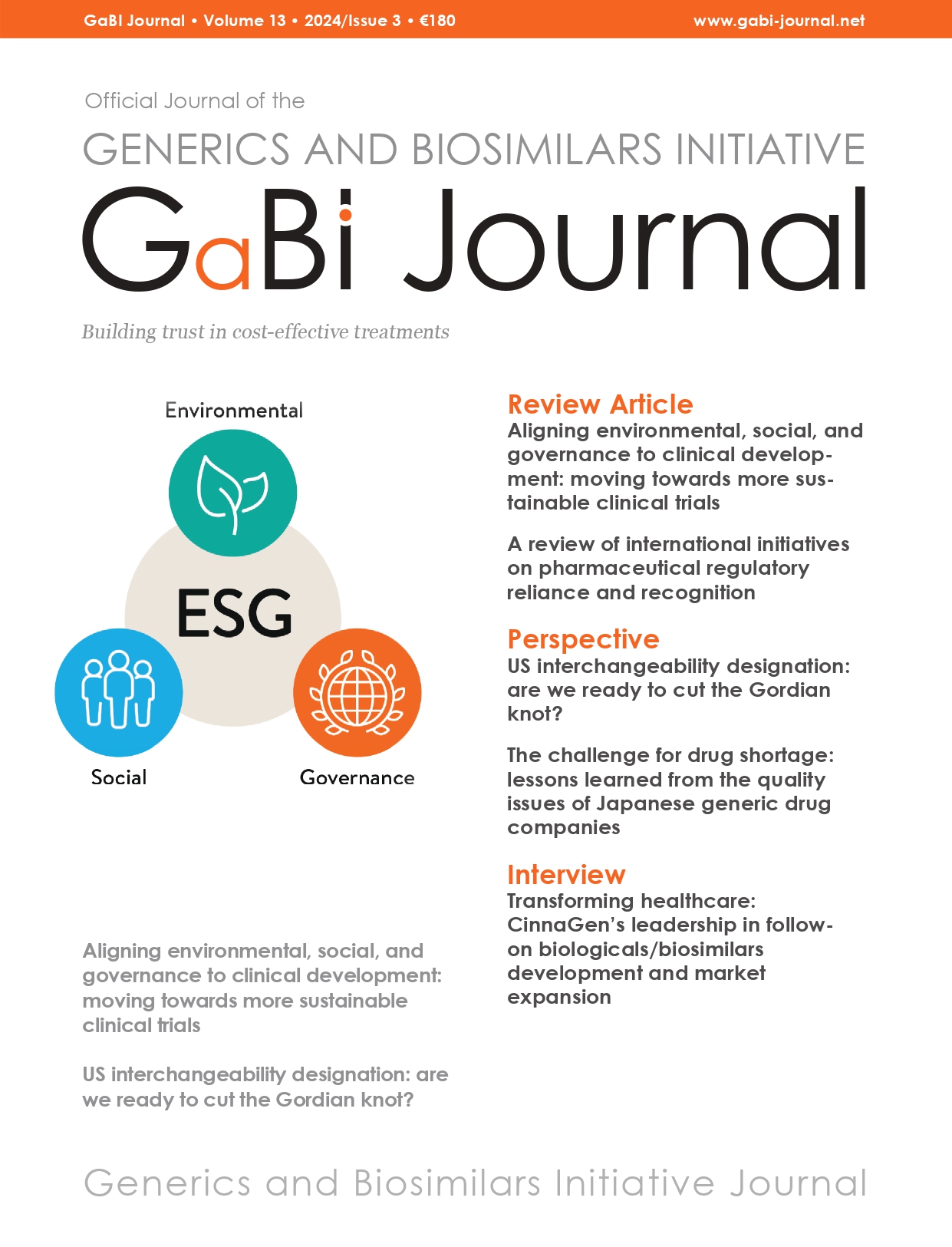WHO leadership in public safety on biosimilars to be commended
Published on 2013/09/27
Generics and Biosimilars Initiative Journal (GaBI Journal). 2013;2(4):167.
|
Abstract: |
Submitted: 20 September 2013; Revised: 21 September 2013; Accepted: 21 September 2013; Published online first: 27 September 2013
More than 50 years ago, World Health Organization (WHO) established the International Nonproprietary Name (INN) expert group to assign non-proprietary names to medicinal substances so that each could be recognized globally by a unique name. Although initially intended to facilitate prescribing, non-proprietary names have come to play an essential role in tracking and tracing, and attributing adverse events to the right product – an important aspect of ensuring medicine safety once a product is on the market. Distinguishable names are particularly important for biologicals.
WHO has shown thoughtful leadership in facilitating the further development of effective biological identification via a unique and universally available designated name for each pharmaceutical substance. This action is very timely in light of the growing number of biosimilars and non-biocomparables arriving on the market. The urgency of this action is apparent with the first monoclonal antibody biosimilar approved in Europe by the European Commission in September 2013 bearing the identical INN as the innovator product.
The practicality of WHO’s action is evidenced in Australia, where the Therapeutic Goods Administration (TGA) has already acted on WHO’s vision for biological and biosimilar naming conventions. Indeed, TGA’s action demonstrates both the importance and the functionality of distinguishable INNs. Under the new regulation, TGA requires the non-proprietary name to include a biosimilar identifier, consisting of the prefix ‘sim(a)’, and a three-letter code issued by WHO’s INN Programme Committee according to its draft policy. The TGA regulation explains, ‘As small differences between biosimilars can give rise to differences in clinical behaviour, in particular in immunogenic effects, certain additional nomenclature provisions are necessary to ensure that it is possible to distinguish between biosimilars and clearly identify the reference product.’
Since the active substance of biologicals is made by or derived from living organisms and most biologicals are very large molecules, biologicals can be sensitive to very minor changes in the manufacturing process. Unlike chemically based drugs, small differences in the manufacturing process and handling, etc.; can significantly affect the nature of the finished biological and the way it functions in the body. Therefore, no two biologicals made from different cell lines and/or using different manufacturing processes are ever identical to the reference product they aim to replicate and, hence, can have a significant impact in a patient’s body.
Knowing specifically which product, produced by which manufacturer a patient received is essential to keeping medicines and patients safe. If a patient develops an unwanted immune response over time, the doctor and regulators will know exactly which product to evaluate. For that reason, product naming is one of the key elements of biological product safety. In fact, the Alliance for Safe Biologic Medicines (ASBM) conducted a survey of more than 350 specialists who prescribe or treat patients with biologicals. We found that non-proprietary product names are the primary means by which physicians identify products.
The vast majority of physicians (99 per cent) refer to biological medicines by INN and not by the ‘national drug code’ number assigned to each product in the United States – for both recording in charts and for reporting adverse events. If distinct non-proprietary names are not given to products, we cannot appropriately track and trace adverse events nationally and even more so globally and may waste valuable treatment time trying to identify the root cause.
ASBM has worked for nearly three years to support health agencies including the US Food and Drug Administration and WHO, in the mission to safely bring biosimilars to patients. We believe all biological policies must be guided by the recognition that biologicals are scientifically different than traditional chemical drugs and the laws governing their approval and regulation must reflect that scientific reality. ASBM will soon be attending the WHO’s upcoming Consultation on International Nonproprietary Names (INN) for Pharmaceutical Substances meeting in October 2013, to further build on the emerging consensus that distinct names are the only way to keep patients safe.
Funding sources
The Alliance for Safe Biologic Medicines (ASBM) is an organization composed of diverse healthcare groups and individuals – from patients to physicians, innovative medical biotechnology companies and others who are working together to ensure patient safety is at the forefront of the biosimilars policy discussion. The activities of ASBM are funded by its member partners, who contribute to ASBM’s activities, with the primary funding provided by the Steering Committee, funds the ASBM’s efforts. Visit www.SafeBiologics.org for more information.
Disclosure of financial and competing interests: Dr Richard O Dolinar, Chairman of the Alliance for Safe Biologic Medicines (ASBM), is employed by ASBM.
This paper is funded by ASBM and represents the policies of the organization.
Provenance and peer review: Not commissioned; internally peer reviewed.
|
Author: Richard O Dolinar, MD, Chairman, Alliance for Safe Biologic Medicines, PO Box 3691, Arlington, VA 22203, USA |
Disclosure of Conflict of Interest Statement is available upon request.
Copyright © 2013 Pro Pharma Communications International
Permission granted to reproduce for personal and non-commercial use only. All other reproduction, copy or reprinting of all or part of any ‘Content’ found on this website is strictly prohibited without the prior consent of the publisher. Contact the publisher to obtain permission before redistributing.



2 Replies to “WHO leadership in public safety on biosimilars to be commended”